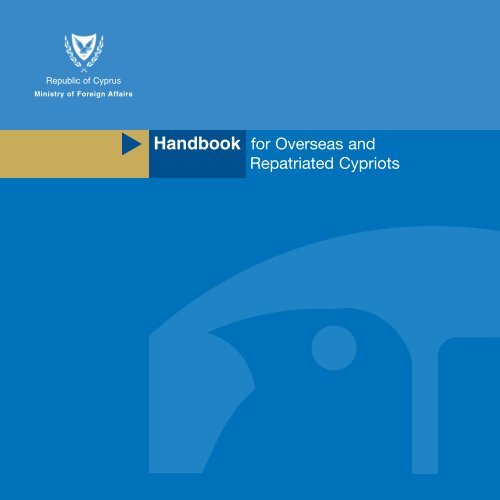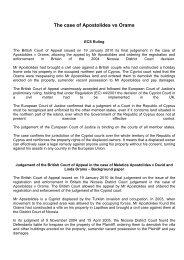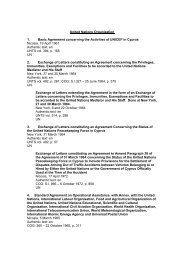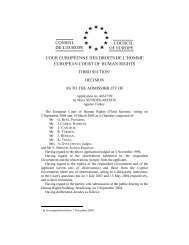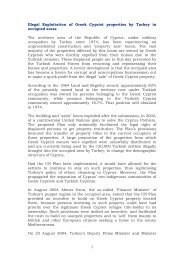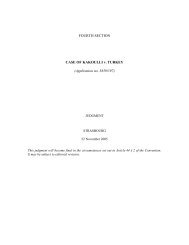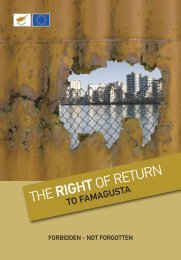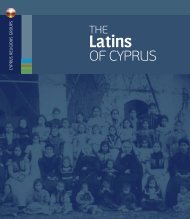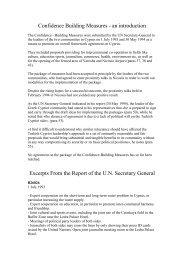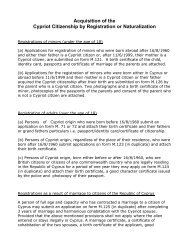Handbook - Ministry of Foreign Affairs
Handbook - Ministry of Foreign Affairs
Handbook - Ministry of Foreign Affairs
Create successful ePaper yourself
Turn your PDF publications into a flip-book with our unique Google optimized e-Paper software.
Republic <strong>of</strong> Cyprus<strong>Ministry</strong> <strong>of</strong> <strong>Foreign</strong> <strong>Affairs</strong><strong>Handbook</strong> for Overseas andRepatriated Cypriots
<strong>Ministry</strong> <strong>of</strong> <strong>Foreign</strong> <strong>Affairs</strong>June 2009Editorial Supervision: Charalambos G. IoannidesStelios GeorgiadesCopy Editor: David PorterPersonal Assistance: Sylvie MantisPublication Coordination: Press and Information OfficeDesigned by Anna TheodosiouPrinted by Zavallis Litho LtdThe sale or other commercial exploitation <strong>of</strong> this publicationor part <strong>of</strong> it is strictly prohibited.Excerpts from the publication may be reproduced withappropriate acknowledgment <strong>of</strong> this publication as thesource <strong>of</strong> the material used.
<strong>Handbook</strong> for Overseas andRepatriated Cypriots
ContentsIntroductory Note 5Introducing Cyprus 6Service for Overseas and Repatriated Cypriots 9Preparing to Repatriate? 10Entry and Stay in Cyprus 12Acquisition <strong>of</strong> Cypriot Citizenship 13Passport Issues 14Civil Identity Cards 15Moving Home, Pets and Car 16Rent Subsidy 19Bringing Vehicles into Cyprus 20Your Driving Licence in the EU 22Financial Issues 24Tax Liability 24Tax Deductions 26Working in Cyprus 27Social Insurance Protection and Payments 28Financial Schemes for Businesses Owned by Women 30Grant Scheme to Support the Competitiveness <strong>of</strong>Manufacturing Sector SMEs 33National Service in Cyprus 36Healthcare 38Education 39Keeping in Touch While Abroad 41
HANDBOOK FOR OVERSEAS & REPATRIATED CYPRIOTSIntroductory NoteWelcome to Cyprus! As a member <strong>of</strong> the European Union, Cyprusnow <strong>of</strong>fers even more to individuals, families and businesses, taking the verybest <strong>of</strong> Cypriot culture and identity and combining it with our fellow EU MemberStates. This handbook has been created with you in mind, whether you havemade the decision to return to Cyprus to live, are considering it, or just want tokeep your connection with the island alive and strong for yourself, for your familyand friends, and/or for your business interests.The information in this handbook outlines your first steps if you are thinkingabout moving to Cyprus, working in Cyprus or visiting Cyprus long-term. Thehandbook will direct you to available public and private sector services that mayhelp to make that move easier, as well as provide you with some interesting anduseful information about the island.For ease <strong>of</strong> reference, you will find contact information, check lists and points<strong>of</strong> interest highlighted in the sidebar. You can use this handbook as:Did you know?Cypriots living abroad can stillmaintain a connection withCyprus through local organizedcommunities and/or via theactivities undertaken by theServices for Overseas andRepatriated Cypriots (see page 9),which is a Division <strong>of</strong> the <strong>Ministry</strong><strong>of</strong> <strong>Foreign</strong> <strong>Affairs</strong>.Contacting usMINISTRY OF FOREIGN AFFAIRSService for Overseas andRepatriated CypriotsProedrikou Avenue 1447,Nicosia,Tel: (00357) 22401173Fax: (00357) 22305040Email: jmiltiadous@mfa.gov.cyWeb: www.mfa.gov.cy(Language selectionGreek/English)A reference guideA checklistAn overviewA gateway to relevant services5
HANDBOOK FOR OVERSEAS & REPATRIATED CYPRIOTSIntroducing CyprusDid you know?Easter is the first Sunday afterthe Paschal Full Moon, which isthe first moon whose 14th day(the ecclesiastic "full moon")is on or after March 21 (theecclesiastic "vernal equinox").RememberThe Republic <strong>of</strong> Cyprus joinedthe EU in May 2004 and tookon the Euro as legal currencyin January 2008.The CYP £ to Euro (€)exchange rate is£1= €0.585274Cyprus lies 800km east <strong>of</strong> Greece and 380km from Rhodes, on the northeasternedge <strong>of</strong> the Eastern basin <strong>of</strong> the Mediterranean; Turkey is 75km to the north, withSyria 105km to the east and Egypt 380km to the south. The Cypriot coasts alternatebetween capes and bays, with both rocky and sandy beaches. The Troodos andPentadaktylos mountain ranges provide the island with dense pine forests andmagnificent vistas.The area <strong>of</strong> the Republic <strong>of</strong> Cyprus under government control has a market economydominated by the service sector, which accounts for 76% <strong>of</strong> GDP (Gross DomesticProduct). Tourism and financial services are the most important industries. TheRepublic’s erratic growth rates over the past decade reflect the economy's reliance ontourism, which is affected by political instability in the region and by economicconditions in Western Europe. Nevertheless, the economy in the area undergovernment control grew a healthy 3.7% to 3.8% per year in 2004, 2005 and 2006, wellabove the EU average. Cyprus joined the European Exchange Rate Mechanism(ERM2) in May 2005 and adopted the Euro as legal tender in January 2008.More than 75% <strong>of</strong> Cypriots are Greek orthodox, representing a body <strong>of</strong> Christianswhose origins are said to extend directly back to Jesus and his Apostles via unbrokenApostolic Succession, its doctrines and foundation attributed to Saints Barnabas, Pauland Mark (A.D. 45). Other faiths practiced on the island include Anglican, Armenianorthodoxy, the Greek Evangelical Church, Islam, Latin Catholic and Maronite. Inaddition to these faiths, a number <strong>of</strong> fellowships are also practiced here. Most <strong>of</strong> theorthodox religious feasts in Cyprus overlap with the public holidays.6
HANDBOOK FOR OVERSEAS & REPATRIATED CYPRIOTSWorking hoursCyprus follows a varied working schedule depending on the season as well as thelocation (i.e., whether urban, rural or tourist).• Public services are open every weekday from 07:30hrs to 14:30hrs with an extendedschedule on Thursdays, when they also operate from 15:00hrs to 18:00hrs. DuringJuly and August, all services close at 14:30hrs.• Banks are open to the public every weekday from 08:00hrs to 13:00hrs with anextended schedule on Mondays, when they are also open to the public from 15:15hrsto 16:45hrs. From May through August, all services close at 13:00hrs. Banks areclosed to the public on weekends and public holidays, although special hours apply insome tourist areas. Most banks provide 24-hour ATMs.• Offices vary depending on the particular business and its size, and can operate from08:00hrs through to 19:00hrs, with or without a midday siesta.• Shopping During the winter period (1st November through 31st March), stores openat 09:00hrs Monday through Saturday, with early closing times on Wednesday (usually14:00hrs) and Saturday (usually 15:00hrs). During the summer period (1st Aprilthrough to 31st October), stores close weekdays between 13:00hrs and 16:00hrs,whilst extending hours on Friday evenings and Saturdays.Did you know?Public Holidays in Cyprus are:• New Years Day (January 1st)• Epiphany (January 6th)• Greek Independence day (March 25th)• Green Monday (according to Easter)• Good Friday• Easter Sunday• Easter Monday• Cyprus National Day (April 1st)• Labour Day (May 1st)• Whit Monday• Assumption Day (August 15th)• Cyprus Independence (October 1st)• Greek National day (October 28th)• Christmas Day (December 25th)• Boxing Day (December 26th)RememberOpening hours <strong>of</strong> <strong>of</strong>fices, shopsand public services variesaccording to the season andlocation. Always check beforesetting out.7
HANDBOOK FOR OVERSEAS & REPATRIATED CYPRIOTSDid you know?The design <strong>of</strong> the Cyprus Flagwas chosen from a competitionwhich stipulated that the designshould not include the coloursblue or red or depictions <strong>of</strong> thecrescent or cross. The winningdesign, by the Turkish CypriotIsmet G¸ney, was <strong>of</strong>ficiallyadopted on 16th August 1960.Origins and Meaning <strong>of</strong> the Flag <strong>of</strong> the Republic <strong>of</strong> Cyprus:The flag <strong>of</strong> Cyprus was selected by President Archbishop Makarios III and approved bythe then Vice-President Mr. Fazil Küçük.The colours were intentionally chosen to symbolize various aspects <strong>of</strong> Cyprus. The whitebackground <strong>of</strong> the flag represents the young Republic heading for peace, having justgained independence from British Rule, while the map <strong>of</strong> the island is golden-yellow (theoriginal map was a copper colour, to underline the historical connection <strong>of</strong> the island withcopper). The green olive branches represent peace.The flag <strong>of</strong> Cyprus is used on land as the national and civil flag and at sea as the nationaland civil ensign. Cyprus has the third largest fleet within the European Union, with 13%<strong>of</strong> the total fleet <strong>of</strong> the 27 EU Member States.Cyprus is the only countrywhich has its land areadepicted on its flag, makingit unique and easy to identify.Cyprus National EmblemIn addition to the Official National Flag <strong>of</strong> Cyprus, the Republic <strong>of</strong> Cyprus also has anemblem. It features a crest <strong>of</strong> olive leaves surrounding a copper-like shield; the shielddepicts a white dove flying with an olive branch. The emblem also includes the date <strong>of</strong>Cyprus independence, 1960.8
HANDBOOK FOR OVERSEAS & REPATRIATED CYPRIOTSService for Overseas and RepatriatedCypriots - <strong>Ministry</strong> <strong>of</strong> <strong>Foreign</strong> <strong>Affairs</strong>The Service for Overseas and Repatriated Cypriots ensures continuousand close contact with overseas Cypriots and the preservation <strong>of</strong> theircultural heritage, their national identity and their religion. The servicehelps these Cypriots maintain their love for and interest in Cyprus, andassists them with any problems or needs that may arise. In particular, theService for Overseas and Repatriated Cypriots is involved with thefollowing:1. Development <strong>of</strong> a registry <strong>of</strong> Overseas Cypriots.2. Direct and indirect contact and communication with overseas Cypriots worldwide,including assistance with the social and educational problems they face, either as agroup or as individuals.3. The arrangement <strong>of</strong> local, regional and world conferences and meetings for the study<strong>of</strong> matters relating to overseas Cypriots and Cyprus.4. The publication <strong>of</strong> a magazine for overseas and repatriated Cypriots, H Kypros Mas.5. The organization <strong>of</strong> performances and cultural exhibitions for overseas andrepatriated Cypriots6. The provision <strong>of</strong> assistance to Cypriot communities abroad in the form <strong>of</strong> coordination,guidance and facilities, including financial support, for efforts overseas Cypriots maketo preserve their mother tongue and their cultural, national and religious heritage.7. The support <strong>of</strong> efforts to establish community centers, clubs and libraries.8. The organization <strong>of</strong> regular visits/trips by Cypriots to Cyprus.9. The encouragement <strong>of</strong> financial investment in Cyprus by Cypriot businessmen andwomen abroad.Did you know?• The Service for Overseas andRepatriated Cypriots publishesa free quarterly magazine,“H Kypros Mas”, written foroverseas Cypriots.• The Service for Overseas andRepatriated Cypriots is in closecontact with organizedfederations and communities<strong>of</strong> overseas Cypriots whereverthey are.Did you know?Archbishop Makarios III initiatedthe idea <strong>of</strong> a service for overseasCypriots. The Service wasestablished in 1976.Contacting usMINISTRY OF FOREIGN AFFAIRSService for Overseas andRepatriated CypriotsProedrikou Avenue 1447, Nicosia,Tel: (00357) 22401173Fax: (00357) 22305040Email: jmiltiadous@mfa.gov.cyWeb: www.mfa.gov.cy(Language selectionGreek/English).9
HANDBOOK FOR OVERSEAS & REPATRIATED CYPRIOTSDid you know?• There are organized groupsin Cyprus led by repatriatesfrom most countries, suchas Australia, Canada, SouthAfrica and the UnitedKingdom. These groups canhelp you to settle in and can<strong>of</strong>ten be an extendedsupport system during thoseearly months.Did you know?• Most communities/councilsprint monthly eventcalendars to help you planactivities and days out inadvance.• Some concerts and festivalsare funded by the state,meaning admission is free.Did you know?• It is useful to acquire acertificate from your localdiplomatic mission orconsular post regarding yourstatus as an overseas Cypriotand for how long you wereabroad. This form can helpyou later when you areapplying for benefits andrepatriate rights.10. Any other initiatives to assist overseas Cypriots in every way, in collaboration withlocal Cypriot diplomatic missions, consular posts and the appropriate Ministries orServices; the coordination <strong>of</strong> efforts in those cases where the performance <strong>of</strong> the taskdemands the activation <strong>of</strong> other Government Services or Departments.11. The adoption <strong>of</strong> a coordinating role whenever the exercise <strong>of</strong> its responsibilities fallswithin the jurisdiction <strong>of</strong> a specific ministry or service (Note: Para. 11 was added on23.11.78 by decision <strong>of</strong> the Council <strong>of</strong> Ministers).To this end, both local and regional efforts are made to ensure a variety <strong>of</strong> supportstructures are in place. These include supporting cultural events, conferences, seminars,research and broadcasting, as well as hosting Cypriot children from abroad and providingvaluable resources to clubs, libraries and schools.Preparing to Repatriate?Welcoming and supporting Cypriots who wish to return to Cyprus and make the islandtheir permanent home is a responsibility the government <strong>of</strong> the Republic <strong>of</strong> Cyprus takesseriously, hence the services and support the Service for Overseas and RepatriatedCypriots and its staff provide. The Service ensures the repatriation process is an informedone, with connections to expatriate Cypriot communities as one <strong>of</strong> the foundations <strong>of</strong>its efforts.Research has shown that returning to one’s country <strong>of</strong> origin is not always easy,particularly at first. Many repatriates expect to come home to a Cyprus the same or similarto the one they left behind, to the one described to them when they were children, or tothe one they experienced as a holiday maker. While some things may have stayed thesame, with the inevitable passage <strong>of</strong> time and the progress <strong>of</strong> technology, the island hasnaturally changed and evolved. A mix <strong>of</strong> euphoria, excitement and confusion is commonto the experience <strong>of</strong> any major change, even more so when moving country. It takespatience and time to cultivate and/or rebuild relationships that will replace those you leftbehind, so be patient.Often referred to as reverse culture shock, the transition from one country – your birthcountry for second and third generation Cypriots – to another can be quite challenging.You will find many <strong>of</strong> your new experiences disorienting, and you will come up againstmany emotional challenges which need time to be worked through. You may notice10
HANDBOOK FOR OVERSEAS & REPATRIATED CYPRIOTSchanges in your sleep patterns, mood swings, anger and impatience, depression, loss <strong>of</strong>interest in others and in activities you once enjoyed, as well as withdrawal and loss <strong>of</strong> yoursense <strong>of</strong> humour. You must remember that reactions such as these are common, and youand your family will require a period <strong>of</strong> personal adjustment. You should pay attention toemotional changes, as well as to practical changes in your daily life. Although no tworepatriates will react the same way to settling in, all repatriates, individuals and families,need to give themselves time, space and support.Everyone is different, and both the excitement – perhaps coupled with disillusionment –and the readjustment period will be unique to each individual. However, experts haveoutlined four main stages a repatriate should expect to experience at some level <strong>of</strong>intensity and for varying lengths <strong>of</strong> time.The first phase, which is sometimes brief, is the processes <strong>of</strong> disengagement. It startswhen you have decided to move and are preparing to pack, saying goodbye to familiarsurroundings, to routines, to family and friends. This period is full <strong>of</strong> anticipation andexcitement, full <strong>of</strong> expectations <strong>of</strong> what’s to come.The next phase, the second, is generally characterized by excitement and feelings <strong>of</strong>conviction. It is during this phase that the repatriate is fascinated by his or her new homeand full <strong>of</strong> positive feelings – it might feel as if you are still on holiday. This phase givesway to the third phase, which is characterized by disorientation and frustration. During thisphase the repatriate will focus on the negative aspects <strong>of</strong> the culture and will have anostalgic view <strong>of</strong> what he or she left behind. Many people find this stage the most difficult,as it is rife with feelings <strong>of</strong> anxiety and disillusionment.The fourth stage <strong>of</strong> repatriation is adjustment, when old routines begin to blend with therepatriate’s new way <strong>of</strong> life. Feelings <strong>of</strong> isolation begin to dissipate, and an understanding<strong>of</strong> the process begins to take hold – you’ll reach a new level <strong>of</strong> acceptance, and your newsurroundings will finally begin to feel more like ‘home’. You’ll function well in your newsurroundings, and as a bicultural individual you will begin to adopt some <strong>of</strong> the traits andbehaviours that complement your new life.The process <strong>of</strong> settling in requires a conscious effort on your part to participate in culturaland community activities. This could be anything from joining the parent action group atyour child’s school to attending exhibitions, festivals, fetes and shows. Give yourselfand your family time to get acquainted with your new surroundings. Feelings such asdisorientation and anger are temporary, and should subside as you readjust.Did you know?There are four main stages thatrepatriates go through whenreturning. It is part <strong>of</strong> what is knownas reverse culture shock and caninclude a rollercoaster <strong>of</strong> emotions.• The first stage, <strong>of</strong>ten calleddisengagement, is the time whenyou start to pack, say goodbye t<strong>of</strong>riends and familiar surroundingsand prepare for your new home.• The second stage is usuallyexciting and euphoric. This is whenyou are experiencing your cultureas a resident and not a holidaymaker.• The third, and <strong>of</strong>ten the mostchallenging stage, is the withdrawalstage, where feelings <strong>of</strong> anxiety,confusion and animosity begin toseep in. This is the stage whererepatriates miss the routine and theway <strong>of</strong> life they learnt in their hostcountries and begin to feel alienatedand sometimes hostile to theirsurroundings. Many choose toabandon their efforts to repatriateat this stage.• The final stage is generally calledthe readjustment and adaptionphase. Often feelings <strong>of</strong> enthusiasmand enjoyment start to come back.At this stage, repatriates celebratetheir bi-cultural identity; theyembrace the positive traits theyhave brought with them and theculture in which they now liveand work.11
HANDBOOK FOR OVERSEAS & REPATRIATED CYPRIOTSRemember• Application for residencymust be made within fourmonths <strong>of</strong> entry into Cyprus.• Application forms can befound online or at the CivilRegistry and MigrationDepartment <strong>of</strong> the <strong>Ministry</strong><strong>of</strong> Interior.• Accompanying documentsand photographs must beoriginals. You should alsoprovide certified copieswhere indicated.Early on, whilst you are still euphoric and excited about returning to Cyprus, make sureyou find a place <strong>of</strong> retreat, one you can get to easily and regularly. This may be a vistapoint in the Troodos Mountains, a place by the beach or even one <strong>of</strong> the island’srevitalized villages. Whenever you feel like withdrawing, this kind <strong>of</strong> safe place willhelp you rebalance. Make sure this is a place you and your family can access andenjoy whenever necessary.This handbook will guide you towards agencies and service centers that will help youto settle in. You will find highlighted points to bear in mind when considering: residencyinformation regarding moving your goods (page 16); bringing your car (page 20).Information regarding your National Service commitment, or that <strong>of</strong> your children,along with an explanation <strong>of</strong> exit permit issues, is found on page 36.Entry and Stay in CyprusPersons <strong>of</strong> Cypriot origin who have not acquired Cypriot citizenship are consideredCypriot citizens and have the same rights as Cypriot citizens. They are exempted fromall immigration procedures – they may enter Cyprus without a visa, and they mayremain in Cyprus, and work in Cyprus, for as long as they wish.Third country nationals married to Cypriot citizens do not acquire any privileges orrights through marriage. They must apply for registration as aliens, and they must alsoapply for temporary residence and work permits, although they have free access to thelabour market.EU nationals married to Cypriot citizens have the right to reside in Cyprus for a period<strong>of</strong> up to three months without any conditions or formalities, but they must be inpossession <strong>of</strong> a valid identity card or passport. For periods <strong>of</strong> residence longer thanthree months, EU nationals must apply for registration at the Civil Registry andMigration Department within four months <strong>of</strong> their arrival. EU nationals have freeaccess to the labour market.Children <strong>of</strong> Cypriot citizens need to be registered in the Republic.12
HANDBOOK FOR OVERSEAS & REPATRIATED CYPRIOTSAcquisition <strong>of</strong> Cypriot CitizenshipRegistration <strong>of</strong> minors(a) Applications for registration <strong>of</strong> minors under the age <strong>of</strong> 18 born abroad after 16 August1960, whose fathers are Cypriot citizens, and for minors under the age <strong>of</strong> 18 bornabroad after 11 June 1999 whose mothers are Cypriot citizens are submitted on formM.121. A birth certificate, identity card, passport and parents’ certificate <strong>of</strong> marriageshould be attached.(b) Applications for registration <strong>of</strong> minors under the age <strong>of</strong> 18 born in Cyprus or abroadafter 16 August 1960 whose father or mother acquired Cypriot citizenship after thebirth <strong>of</strong> said minor, or who were born before 11 June 1999 to a Cypriot citizen, aresubmitted on form M.126 by the parent who is a Cypriot citizen. Two photographs anda birth certificate <strong>of</strong> the minor, photocopies <strong>of</strong> the parents’ passports and consent <strong>of</strong>the parent who is not a Cypriot citizen must be attached.Registration <strong>of</strong> adults (above the age <strong>of</strong> 18)(a) Persons <strong>of</strong> Cypriot origin who were born before 16 August 1960 must submit anapplication on form M. 71 or 72 and attach their birth certificate, their father’s birthcertificate and a photocopy <strong>of</strong> their passport.Did you know?• All applications for citizenshipare signed before a Judge ora Court Registrar, if they aresubmitted from Cyprus, orbefore a Consular Officer <strong>of</strong> theRepublic <strong>of</strong> Cyprus, if they aresubmitted from abroad.(b) Persons <strong>of</strong> Cypriot origin regardless <strong>of</strong> their place <strong>of</strong> residence who were born after16 August 1960 must submit applications on form M.123 (in duplicate) and attach theirbirth certificate, their parents’ marriage certificate and a photocopy <strong>of</strong> their passport.(c) Persons <strong>of</strong> Cypriot origin born before or after 16 August 1960 who are British citizensor citizens <strong>of</strong> any Commonwealth country and have resided legally in the Republic <strong>of</strong>Cyprus for a period <strong>of</strong> one year may apply for citizenship on form M.124 (in duplicate).M.124 requires a birth certificate, a good character certificate issued by the police, anda photocopy <strong>of</strong> the applicant’s passport.Registration as a result <strong>of</strong> marriage to a Cypriot citizenA person <strong>of</strong> full age and capacity who has contracted a marriage to a citizen <strong>of</strong> Cyprusmay submit an application on form M.125 (in duplicate) after completing three years <strong>of</strong>marriage and harmonious cohabitation with their Cypriot spouse – these provisions do not13
HANDBOOK FOR OVERSEAS & REPATRIATED CYPRIOTSapply if the foreign spouse has entered or resided illegally in Cyprus. A marriagecertificate, a certificate <strong>of</strong> cohabitation <strong>of</strong> the two spouses, the applicant’s birth certificate,a good character certificate issued by police and the Cypriot spouse’s particulars must beattached.NOTE: Applications for citizenship are submitted to the Consular Authorities abroad, tothe Director <strong>of</strong> the Civil Registry and Migration Department or to the District AdministrationOffices (if the applicants are in Cyprus).Passport issuesCyprus passports are issued only to Cypriot citizens. All overseas Cypriots who are notCypriot citizens (e.g., those born abroad after 16 August 1960 or those who emigratedbefore 16 August 1955) must acquire Cypriot citizenship before submitting an applicationfor a Cyprus passport. Overseas Cypriots must apply to the Cypriot Consular Authoritiesabroad. Passports are generally issued with a validity <strong>of</strong> ten years.Contacting usMINISTRY OF INTERIORCivil Registry and MigrationDepartmentDimostheni Severi, 1457, NicosiaTel: (00357) 22804400Fax: (00357) 22804598Email:migration@crmd.moi.gov.cyWeb: www.moi.gov.cy(Language selection Greek)Children <strong>of</strong> overseas Cypriots who are born abroad do not automatically acquire Cypriotcitizenship by birth – to acquire a Cyprus passport, their parents must have themregistered as Cypriot citizens.Children <strong>of</strong> overseas Cypriots may be included on the Cypriot passport <strong>of</strong> their parents,provided they acquire Cypriot citizenship and are under the age <strong>of</strong> 12. However, theycannot travel without being accompanied by the holder <strong>of</strong> the passport on which they areincluded. Children may also acquire their own Cyprus passports upon application by theirparents. The consent <strong>of</strong> both parents is required for the issuance <strong>of</strong> a passport to a minor.The issue <strong>of</strong> an initial Cyprus passport requires two recent photos, a birth certificate anda marriage certificate. To renew a Cyprus passport, you must submit the expiring passportwith two current photos.You must immediately report a lost or stolen passport to the local police authorities andto the nearest Consular Authorities. New passports are issued in such cases only afterthorough investigation and are valid for one year only. Upon expiry <strong>of</strong> this one-yearpassport, a new passport is issued, free <strong>of</strong> charge, which is valid for 10 years.The fee for the issue <strong>of</strong> a passport is €42,72. In the case <strong>of</strong> a lost or stolen passport, thefee is €85,45.14
HANDBOOK FOR OVERSEAS & REPATRIATED CYPRIOTSCivil Identity CardsOn reaching the age <strong>of</strong> twelve (12), all citizens <strong>of</strong> the Republic <strong>of</strong> Cyprus, all overseasCypriots and all other persons legally residing in Cyprus are required to attain and be inpossession <strong>of</strong> a Civil Identity Card. The Civil Identity Card is used as a pro<strong>of</strong> <strong>of</strong> identity, inorder for the holder to gain access to various services, and can also be used as a traveldocument in EU Member States. The Civil Identity Card should be carried with you at alltimes.The identity card is valid for ten years for adults and for five years for minors under theage <strong>of</strong> 18.RememberFor a Civil Identity Card, you will need to:• Complete the relevant application form.• Apply in person.• Provide an original certified photograph (4X3cm).• Provide an original birth certificate.• Provide either a marriage or a divorce certificate, in cases <strong>of</strong> name changes.• Provide a passport, in cases <strong>of</strong> dual nationality.If you have alien status with lawful residence in Cyprus, you should present your AlienRegistration Certificate, your Residence Permit and an <strong>of</strong>ficially translated BirthCertificate, in addition to your passport.Remember• It is normal to feelemotionally and physicallydrained during repatriation.• Give yourself and yourfamily time to adjust.Be fair to yourself.• Go as frequently as youneed to to your ‘safe place’.• Get involved in localactivities.• Celebrate your biculturalidentity.• Stay open–minded.Electoral ListsCypriot citizens by origin who are 18 and over and have been resident in Cyprus for atleast six months prior to the date <strong>of</strong> registration can apply for a voting booklet and beadded to the electoral register free <strong>of</strong> charge.The electoral lists are drawn up every three months on the second day <strong>of</strong> January, April,July and October. The names <strong>of</strong> new voters and new voter cards are issued only after theelectoral list has been displayed and inspected for possible objections by every interestedperson, per legal requirements.15
HANDBOOK FOR OVERSEAS & REPATRIATED CYPRIOTSContacting usCUSTOMS AND EXCISE OFFICECorner <strong>of</strong> M. Karaoli and GAfxentiou, 1440 Nicosia,Tel: (00357) 22601713Fax: (00357)22302031Email:headquarters@customs.m<strong>of</strong>.gov.cyWeb: www.m<strong>of</strong>.gov.cy(Language selection Greek,English, Turkish).Remember• Member States can protecttheir citizens by settingspecific limits on themovement <strong>of</strong> goods into andthrough their countries. Theselimits may be set for healthand/or safety reasons, orfor the protection <strong>of</strong> theenvironment.• Always check currentlegislation. You can purchasea copy from the publishing<strong>of</strong>fices at Mihalaki KaroliStreet in Nicosia (part <strong>of</strong>the <strong>Ministry</strong> <strong>of</strong> FinanceTel: 22405811).• You will need to know thename and number <strong>of</strong> thelegislation you require.The Civil Registry and Migration Department and the Local Offices <strong>of</strong> DistrictAdministrations issue voting cards. Change <strong>of</strong> name and/or address is free <strong>of</strong> charge, butreplacement <strong>of</strong> the booklet due to loss or wear and tear carries a small fee.You must have the following in order to register:• Completed application form• A passport photo• Certificate from your community president, unless attending in person• Verification from the leader <strong>of</strong> a religious group, if you wish to lodge a religiouspreference.Moving Home, Pets and CarAlthough you’ve made the decision to move to Cyprus and your excitement is high, manypractical issues still require your attention. Moving your household to Cyprus means yourfamily, your pets and most <strong>of</strong> your possessions – perhaps even your car. This sectionexplains how to register your car, how to obtain a Cypriot driving license, and how muchduty you will have to pay, if any, on entering Cyprus.Moving GoodsThe free movement <strong>of</strong> goods is one <strong>of</strong> the cornerstones <strong>of</strong> the European Single Market,and the removal <strong>of</strong> national barriers to the free movement <strong>of</strong> goods within the EU is one<strong>of</strong> the principles enshrined in numerous EU treaties.Although the EU is committed to breaking down internal trade barriers, not all sectors <strong>of</strong>the economy have been harmonized. Within Europe, the EU regulates some sectors <strong>of</strong>the economy that might present a “higher risk” for its citizens, including constructionproducts and pharmaceuticals. Most products, however, are considered ”lower risk” andare subject to the application <strong>of</strong> the so-called ”principle <strong>of</strong> mutual recognition”, whichmeans that essentially every product legally manufactured or marketed in one <strong>of</strong> theMember States can be freely moved and traded within the EU.16
HANDBOOK FOR OVERSEAS & REPATRIATED CYPRIOTSLimits to the free movement <strong>of</strong> goodsThere are some limitations to what and how much can be moved between memberstates. The EU Treaty gives Member States the right to set limits to the free movement <strong>of</strong>goods when there is a specific common interest, such as the protection <strong>of</strong> citizens’ health,the environment or public policy. This means that if the national authorities <strong>of</strong> a MemberState consider the import <strong>of</strong> a product a potential threat to public health, public morality orpublic policy, the authorities can deny or restrict its importation – examples <strong>of</strong> suchproducts include genetically modified food or certain energy drinks. There is a series <strong>of</strong>European restrictions for specific categories <strong>of</strong> products, such as alcohol and tobacco, butthere are generally no limitations for the purchase <strong>of</strong> goods in any Member State, as longas they are for personal use.Moving your Personal Property within Member StatesPersons who transfer their normal residence from another Member State to the Republicare allowed to import their personal property without payment <strong>of</strong> import duties and VAT,provided they have been acquired after payment <strong>of</strong> all local duties and taxes and neverrefunded or exempted on exportation. You must transfer your personal property to theRepublic no later than 12 months from the date <strong>of</strong> transfer <strong>of</strong> your prior residence.For the purposes <strong>of</strong> the law, personal property means property <strong>of</strong> personal use for thepersons concerned, or for the needs <strong>of</strong> their household, which does not reflect anycommercial interest by its nature or quantity. “Personal property” may include thefollowing: camping caravans, cycles, household effects, household pets and saddleanimals, household provisions appropriate to normal family requirements, motorcycles,pleasure craft and private aeroplanes, portable instruments <strong>of</strong> the applied or liberal artsand private motor vehicles and their trailers. Exemption from the excise duty is grantedfor one vehicle only per person. This person:• Must hold a valid driving licence, and• Has acquired and used the vehicle, at his former place <strong>of</strong> residence, for a minimumperiod <strong>of</strong> six months before his transfer to CyprusThe vehicle may not be sold, disposed <strong>of</strong>, hired out, lent or transferred without the priorapproval <strong>of</strong> the Director <strong>of</strong> Customs.Did you know?• You can use the form AP1to apply for relief from exciseduties when transferring toCyprus from another EUMember State.• Form AP1 can be downloadedfrom the Customs and Excisewebsite(www.m<strong>of</strong>.gov.cy/customs)or obtained from any Customs<strong>of</strong>fice.17
HANDBOOK FOR OVERSEAS & REPATRIATED CYPRIOTSDid you know?• You can use the form AP2to apply for relief fromexcise duties whentransferring to Cyprusfrom outside the EU.• Form AP2 can bedownloaded from theCustoms and Excise website(www.m<strong>of</strong>.gov.cy/customs)or obtained from anyCustoms <strong>of</strong>fice.Form AP1, which can be downloaded from the Customs and Excise website(www.m<strong>of</strong>.gov.cy.ce) or obtained from any Customs Office on the island, is used forapplying for relief from excise duties in case <strong>of</strong> transfer <strong>of</strong> normal residence from anotherEU Member State. You may present a completed form AP1, together with the necessaryevidence to support your claim for relief, at any Customs Station.Moving your Personal Property from a country outside theEuropean Union to CyprusRelief from import and excise duty and VAT is granted for ”personal property” belongingto a private individual who transfers his or her normal residence to Cyprus from a countrywhich is not within the EU. As with all Member States, personal property may include thefollowing: camping caravans, cycles, household effects, household pets and saddleanimals, household provisions appropriate to normal family requirements, motorcycles,pleasure craft and private aeroplanes, portable instruments <strong>of</strong> the applied or liberal artsand private motor vehicles and their trailers.No relief is granted for alcohol, for tobacco or tobacco products, for commercial means <strong>of</strong>transport or for articles used in the exercise <strong>of</strong> a trade or pr<strong>of</strong>ession, other than portableinstruments <strong>of</strong> the applied or liberal arts.Relief is granted for only one vehicle per person; this person must hold a valid drivinglicense.The following terms and conditions must be fulfilled:• The personal property has been in your possession and used by you at your normalplace <strong>of</strong> residence for a minimum <strong>of</strong> six months before the date on which you ceaseto reside in the country <strong>of</strong> origin.• Is intended to be used for the same purpose at your new residence.• Has been acquired according to the general conditions <strong>of</strong> taxation in force, in thedomestic market <strong>of</strong> the country <strong>of</strong> origin.• Must be imported within a period <strong>of</strong> six months before or twelve months after thetransfer <strong>of</strong> your normal residence to the Republic.• You had your normal residence outside the EU for a continuous period <strong>of</strong> at least 12months prior to the transfer <strong>of</strong> residence.18
HANDBOOK FOR OVERSEAS & REPATRIATED CYPRIOTSThe personal property for which relief is granted shall not be lent, pledged, hired out ortransferred for a period <strong>of</strong> twelve months following the transfer <strong>of</strong> your residence, unlessthe import duties are paid with the permission <strong>of</strong> the Director <strong>of</strong> Customs and Excise.Form AP2, which can be downloaded from the Customs and Excise website(www.m<strong>of</strong>.gov.cy/ce) or obtained at any Customs Office on the island, is an application forrelief from import and excise duties and VAT. You may present a completed form AP2,together with the necessary evidence to support your claim for relief, at any CustomsStation.Rent SubsidyAs part <strong>of</strong> the Republic’s commitment to helping repatriates, the Government <strong>of</strong> Cyprus<strong>of</strong>fers repatriates a rental subsidy allowance for the first year. The subsidy is based on thenumber <strong>of</strong> people repatriating and sharing a rental house. Application forms are not yetavailable on line but can be obtained at regional <strong>of</strong>fices <strong>of</strong> the Special Service for the Careand Rehabilitation <strong>of</strong> Displaced Persons in Larnaca, Limassol, Nicosia and Pafos. Allapplication forms must be accompanied by:Contacting usCUSTOMS AND EXCISE OFFICE1 Andrea Kariou, Engomi 2409Nicosia,Tel: (00357) 22407509Email:nicosia@customs.m<strong>of</strong>.gov.cyWeb: www.m<strong>of</strong>.gov.cy(Language selection Greek,English, Turkish).• A copy <strong>of</strong> your signed home rental agreement.• Confirmation from the Embassy, Consulate or High Commission <strong>of</strong> at least ten yearsabsence from Cyprus.• Copies <strong>of</strong> your Cypriot civil identity card (front and back).• Copies <strong>of</strong> your passport.For more information, contact the Rent Subsidy Office for Displaced and AdverselyAffected Persons, <strong>Ministry</strong> <strong>of</strong> the Interior, Nicosia, Tel. 22-871837.19
HANDBOOK FOR OVERSEAS & REPATRIATED CYPRIOTSDid you know?• Motor vehicle relief is limitedto one claim per family.This means that a child over18 who is financiallydependent on his or herparents cannot make aseparate application.• Relief covers excise duty upto a total <strong>of</strong> €11,960.21 (forrepatriated Cypriots) and€5,125.80 (for immigrantswhose fathers are Cypriot).These amounts do notinclude VAT - any amount inexcess <strong>of</strong> this must be paid.• Motorcycles, buses, doublecabin trucks and caravansdo not qualify for relief.• You can only use thisexemption to pay duty once.Did you know?• If you were a minor at thebeginning <strong>of</strong> the 10 yearperiod, you will need tosubmit your parents’passports or otherdocuments to prove youwere living abroadpermanently.Bringing Vehicles into CyprusTravelling across the European Union with your car has become a lot less problematic,as the European Commission has instituted a series <strong>of</strong> common regulations governingthe mutual recognition <strong>of</strong> driving licences, the validity <strong>of</strong> car insurances, and theregistration <strong>of</strong> your car in a host country. If you repatriate to Cyprus and make it yourpermanent home after living abroad for at least ten years continuously, you may beentitled to apply for relief on motor vehicle duty.Relief on vehicles for CypriotsYou must be a Cypriot permanently residing in Cyprus after having lived abroad for acontinuous period <strong>of</strong> at least ten years to be entitled to relief on motor vehicle duty. Youare entitled to relief on one motor vehicle per family unit; this means that a child over 18years <strong>of</strong> age who still lives at home and is financially dependent cannot make a separateapplication. As long as you import/transfer or buy the vehicle for which you are seekingexcise relief within one year <strong>of</strong> moving to Cyprus, you are eligible to apply.Customs and Excise denote three main categories outlining qualifications for duty reliefon motor vehicles:(a) Citizens <strong>of</strong> the Republic who, during the twelve years preceding their arrival in theRepublic, have worked abroad for a total period <strong>of</strong> at least ten years since 20th July1974. Relief covers import and excise duty up to €11,960.21 and is granted for onevehicle per family.(b) Repatriated Cypriots who return to settle permanently in the Republic after permanentresidence abroad after a continuous period <strong>of</strong> at least ten years. Relief covers exciseduty only up to €11,960.21 and is granted for one vehicle per family.(c) Persons with Cypriot fathers who arrive to take up permanent residence in Cyprusafter permanent residence abroad for a continuous period <strong>of</strong> at least ten years. Reliefcovers excise duty only up to €5,125.80.20
HANDBOOK FOR OVERSEAS & REPATRIATED CYPRIOTSThe following terms and conditions apply:• Relief is limited to one vehicle per family (spouse and dependents).• Motorcycles, buses, double cabin trucks and caravans do not qualify for relief.• The vehicle must be imported/transferred or purchased in Cyprus within one year afteryour arrival.• The vehicle will not be lent, sold, pledged, hired, exchanged or otherwise disposed <strong>of</strong>in the Republic without the prior permission <strong>of</strong> the Director <strong>of</strong> Customs.In order to meet the requirement <strong>of</strong> these categories <strong>of</strong> relief, you must submit theapplication forms P16A, P16B or P16°, respectively, together with all required evidence.The application forms can be downloaded from the Customs and Excise website(www.m<strong>of</strong>.gov.cy.ce) or obtained at any Customs Office in Cyprus.Remember• Import duty is charged when a vehicle is imported from a country outside the European Union. Evenwhen relief is granted for duty payable on your motor vehicle, you may still need to pay the VAT on:• Brand new vehicles.• Used vehicles imported from outside the European Union.• Used vehicles where VAT has been paid in a Member State but refunded on exportation.In order to submit an application form, be sure you have the relevant supportingdocumentation before going to the Nicosia Customs House. You will need originals andphotocopies <strong>of</strong>:• Passports for you and your family for the ten years prior to your repatriation.• Certificate <strong>of</strong> nationality from your former country <strong>of</strong> residence.• Marriage certificate.• Regular Cypriot driving licence or a driving license from an EU Member State.• Documentation to show the importation <strong>of</strong> your household effects.Be sure to ask if there is any other documentation required.Did you know?• You cannot sell, lend, pledge,hire or exchange vehicles forwhich you have not paidimport and excise dutieswithout the prior consent <strong>of</strong> theDirector <strong>of</strong> Customs.• Only you, your spouse andyour children are entitled touse vehicles that have beenrelieved <strong>of</strong> import and exciseduties.Contacting usCUSTOMS AND EXCISE OFFICE1 Andrea Kariou,Engomi 2409 Nicosia,Email:nicosia@customs.m<strong>of</strong>.gov.cyheadquarters@customs.m<strong>of</strong>.gov.cyWeb: www.m<strong>of</strong>.gov.cywww.m<strong>of</strong>.gov.cy/ce(Language selection Greek,English, Turkish)Temporary importation<strong>of</strong> motor vehicles:22407525, 22407526,22407538, 22407591Relief from duty and taxes:22407531, 22601657,22601658 and 22601872Taxation <strong>of</strong> motor vehicles:22601748 and 2260175321
HANDBOOK FOR OVERSEAS & REPATRIATED CYPRIOTSOnce your application has been approved and your vehicle has been cleared fromcustoms and any payable duties, Customs Officers will issue you form C72.A, which youwill need to register your vehicle with the Department <strong>of</strong> Road Transport.Remember – Ten-year rule points to considerYou will need to demonstrate that you have lived permanently abroad for at least ten years. This includes:• Pro<strong>of</strong> <strong>of</strong> an entry stamp which has no time restrictions. For example, from the United Kingdom you willneed a stamp which states, “given leave to enter the U.K. for an indefinite period”; from the USA, you willneed a green card or a relevant stamp; from Greece, you will need pro<strong>of</strong> <strong>of</strong> at least ten years employment;if you are coming from Canada, you must be considered a “landed immigrant” in Canada.• Marriage certificates that are at least ten years prior to the date <strong>of</strong> settlement in Cyprus may beconsidered, along with other evidence.• Certificates <strong>of</strong> nationality from the country you have lived in, as well as certificates from schools,diplomas and other pro<strong>of</strong> <strong>of</strong> education abroad (studying or working abroad temporarily is not considereda permanent move).• Indirect forms <strong>of</strong> pro<strong>of</strong> – tax returns, social insurance payments, wages receipts and medical reports –may be used to support a claim where passports and other direct evidence are not readily available.• Keep copies <strong>of</strong> all documents you submit for your own records.Did you know?• A holder <strong>of</strong> a driving licencefrom Australia, Canada,Georgia, Japan,Lichtenstein, New Zealand,Norway, Russia, Serbia,South Africa, South Korea,Switzerland, Ukraine, USAand Zimbabwe can drive fora period <strong>of</strong> six months inCyprus. After six monthsyou will need to exchangeyour licence for a Cypriotlicense.Your driving licence in the EUThe EU member states have introduced a “Community Model” driving licence, a commonmodel that ensures that driving licences issued by different EU countries are mutuallyrecognised in all Member States. The licence is issued in accordance with national law,which is harmonised with the relevant European directives. Driving licences issued before1996 must be exchanged for the new Community Model driving licence.If an EU citizen relocates to another Member State, it is not necessary to exchange thedriving licence, although many people do so for practical reasons. Some Member Statesrequire that additional data be included on their licenses, in order to fulfil certainadministrative requirements.22
HANDBOOK FOR OVERSEAS & REPATRIATED CYPRIOTSIn the event <strong>of</strong> expiry, loss or theft, a new driving licence can be issued in the driver’sMember State <strong>of</strong> residence, in accordance with national conditions.Moving <strong>of</strong> Animals and PlantsCitizens <strong>of</strong> the European Union who reside in one Member State and wish to transfer theirnormal residence to the Republic <strong>of</strong> Cyprus may bring their pets with them. The followingrules apply to the non-commercial movement <strong>of</strong> pet animals. For the purpose <strong>of</strong> thisdocument, “pet animals” means cats, dogs and ferrets. The animal must be accompaniedby its owner (a natural person) or by a person who is responsible for it. The sale ortransfer <strong>of</strong> such animal to another owner is prohibited.Any pet animal entering the territory <strong>of</strong> the Republic <strong>of</strong> Cyprus must be at least 111 daysold and vaccinated against rabies. The entry <strong>of</strong> pet animals aged less than 111 days oldis prohibited regardless <strong>of</strong> the country <strong>of</strong> origin. In order to be vaccinated against rabiesthe animal must be at least three months old. The completion <strong>of</strong> the protocol for theanimal’s primary vaccination must take place at least 21 days prior to the movement <strong>of</strong>the animal to Cyprus. The period <strong>of</strong> 21 days is not applicable in cases <strong>of</strong> re-vaccinations(booster vaccinations), provided they are administered within the period <strong>of</strong> validityindicated by the manufacturer <strong>of</strong> the vaccine used in the previous vaccination.Upon arrival, every animal and its accompanying documents are inspected by a CustomsOfficer. If the respective entry requirements for each case are met, the animal can enterinto the territory <strong>of</strong> the Republic <strong>of</strong> Cyprus. When the need for an inspection by aVeterinary Officer arises, the owner or the person responsible for the pet animal(s) paysall relevant inspection fees.Did you know?• Dogs <strong>of</strong> the following breedsmay not be imported intoCyprus from any country:American pit bull terriers orpit bull terriers, Japanese tosa,tosa Inu, Dogo Argentino,Argentinian mastiffs, filabrasileiro and Brazilian mastiffs.Did you know?• The only restrictions on thetransfer <strong>of</strong> plants to theterritory <strong>of</strong> the Republic <strong>of</strong>Cyprus are those which applyto the plants listed in Annex Vto Directive 2000/29/EC, forwhich a phytosanitarycertificate is required.Remember – Ten-year rule points to consider• Each animal must be accompanied by a European pet animal passport (Decision 2003/803/EC).• ∂ach animal must be individually identified by a clearly readable tattoo (accepted until 3/7/2011) oran electronic identification system (transponder-microchip). The transponder-microchip mustcomply with ISO standard 11784 or annex A to ISO standard 11785.• In case <strong>of</strong> pet animals entering the territory <strong>of</strong> the Republic <strong>of</strong> Cyprus from a third country, youshould contact Veterinary Services regarding all applicable conditions.23
HANDBOOK FOR OVERSEAS & REPATRIATED CYPRIOTSIf any or all <strong>of</strong> the above-listed requirements are not met, the animal may be returned tothe country <strong>of</strong> origin (re-exported) or isolated in quarantine for as long as it is necessaryfor it to meet the health requirements (no more than six months). The animal may beeuthanized, without any compensation to the owner or the person responsible for theanimal, if re-exportation or isolation in quarantine for the required period is not feasible.Before leaving for Cyprus you are advised to contact the Veterinary Services <strong>of</strong> theRepublic <strong>of</strong> Cyprus in order to confirm that you have fulfilled all provisions and requirementsin force for the movement <strong>of</strong> pet animals into the Republic.Contacting usMINISTRY OF FINANCEMichael Karaoli and GregoriAfxentiou 1439 Nicosia,Tel: (00357) 22601722Fax: (00357)22Web: www.m<strong>of</strong>.gov.cy(Language selection Greek,English, Turkish).Did you know?• If you are not a resident <strong>of</strong>Cyprus for tax purposes, youwill only pay taxes on incomeearned in Cyprus.Financial IssuesWhether you are repatriating as a pensioner or as a working family, you will need toaddress issues related to your personal finances soon after you settle permanently inCyprus. You will need to know where and how to make tax and social security payments,or how to collect your pension. You may even be interested in what business schemesare available and how to apply.Remember• Retirement lump sums, lump sum repayments from life insurance schemes, interest income,widow’s pension and dividend incomes are amongst the incomes which are exempt from anincome tax levy.Tax LiabilityTax liability in Cyprus is based on the principle <strong>of</strong> residence (tax residence). A companyis considered to be resident in Cyprus if its management and control is exercised inCyprus, while an individual is considered to be resident in Cyprus if he or she residestherein for more than 183 days in any tax year. Cyprus residents are taxed on worldwideincome, while non-Cyprus residents are taxed on their Cyprus income only. Non-Cyprusresidents having a permanent establishment in Cyprus may opt to be taxed as Cyprusresidents. Cyprus residents are responsible for a special contribution to the defence <strong>of</strong> the24
HANDBOOK FOR OVERSEAS & REPATRIATED CYPRIOTSRepublic. As such, their dividend, interest and rental income is taxed at the rate <strong>of</strong> 15%,10% (3% for certain types <strong>of</strong> interest income) and 3% respectively.There are some income tax exemptions:• 100% <strong>of</strong> interest income earned by individuals and 50% <strong>of</strong> interest income earned bycompanies (excluding interest derived from the ordinary course <strong>of</strong> business andinterest which is closely connected to the ordinary course <strong>of</strong> business).• Dividends.• Pr<strong>of</strong>its attributed to permanent establishments abroad, subject to certain restrictions.• Lump sum retirement payments.• Capital sums from approved life insurance policies, provident and pension funds.• Pr<strong>of</strong>it from sale <strong>of</strong> shares.• Income from employment services provided abroad to a non-resident employer or toan overseas permanent establishment <strong>of</strong> a resident employer for a period exceeding90 days in any tax year.• €5,000 or 20%, whichever is less, <strong>of</strong> the remunerations from any <strong>of</strong>fice or employmentexercised in Cyprus by an individual who was resident outside Cyprus before thecommencement <strong>of</strong> his employment. The exemption applies for 3 years beginning onthe first <strong>of</strong> January <strong>of</strong> the year following the year in which the employment commences.• Certain pensions.• Income from a bursary, exhibition, scholarship or any other similar educationalendowment held by an individual receiving full time instruction.• Income from charitable, educational or religious institutions <strong>of</strong> a public character.Remember• Retirement lump sums, lump sum repayments from life insurance schemes, interest income,widow’s pension and dividend incomes are amongst the incomes which are exempt from anincome tax levy.Did you know?• There is a special contributionfor defence. It is imposed on theinterest, dividends and rentalincome <strong>of</strong> Cyprus tax residents,individuals and companies, andis subject to certain exceptions.It is also levied on the pr<strong>of</strong>its <strong>of</strong>public corporate bodies.Did you know?• Immovable property situated inCyprus is subject to tax on themarket value <strong>of</strong> the property asat January 1st 1980, inaccordance with the valuation <strong>of</strong>the Lands and SurveysDepartment.• Capital gains tax is imposed atthe rate <strong>of</strong> 20% on gains arisingfrom the disposal <strong>of</strong> immovableproperty situated in Cyprus orthe disposal <strong>of</strong> shares in acompany which ownsimmovable property situated inCyprus. Exemptions fromcapital gains tax include, interalia, gains arising in the context<strong>of</strong> company reorganizations.25
HANDBOOK FOR OVERSEAS & REPATRIATED CYPRIOTSDid you know?• Corporation tax is imposed ata rate <strong>of</strong> 10% on chargeableincome.• Public corporate bodies areliable to tax at a rate <strong>of</strong> 25%on chargeable incomeTax DeductionsThere are some deductions permitted with regard to income tax payments. Thesedeductions, which are subject to certain conditions, include: the bad debts <strong>of</strong> anybusiness; donations or contributions made for cultural, educational or other charitablepurposes to the Republic or a local authority; expenditures incurred relating to thepreservation <strong>of</strong> buildings and monuments.Some capital allowances apply and are deducted for reasonable wear and tear <strong>of</strong> fixedassets as a result <strong>of</strong> their commercial use (restrictions apply). Some personal allowancesare also exempt, such as contributions to the social security fund or an approved pensionfund, life insurance premiums (with a limit <strong>of</strong> 7% <strong>of</strong> the capital sum), and contributionsmade for the general health scheme or other approved medical schemes. However, thesum <strong>of</strong> the aforementioned cannot exceed 1/6 <strong>of</strong> the chargeable income before suchdeductions are made.Remember• Relief for double taxation in respect <strong>of</strong> foreign source income is available via the credit methodunder any <strong>of</strong> the double tax agreements presently in force, which cover 42 states, or may beobtained unilaterally where no such double tax agreement is available. You can get moreinformation at www.m<strong>of</strong>.gov.cy/ird<strong>Foreign</strong> exhange – captial movements and paymentsThere are no restrictions on the import or export <strong>of</strong> banknotes. However, when enteringor leaving Cyprus, banknotes and/or gold with a value equal to or exceeding €12.500must be declared to Customs Officers. Travellers to or from non-EU countries mustdeclare any currency or bearer-negotiable instruments <strong>of</strong> a value <strong>of</strong> €10.000 or more, inaccordance with current EU regualtions.26
HANDBOOK FOR OVERSEAS & REPATRIATED CYPRIOTSWorking in CyprusOverseas Cypriots may apply for employment in Cyprus while they are abroad bycompleting the relevant application form, which is available from Cyprus Diplomaticmissions abroad or from the Department <strong>of</strong> Labour. Cypriot repatriates without Cypriotcitizenship may stay and work in Cyprus without formalities for an unlimited period,although there are certain exceptions with regard to “regulated pr<strong>of</strong>essions” which arerestricted to holders <strong>of</strong> special qualifications. For information regarding regulatedpr<strong>of</strong>essions, contact Marilena Pelekanou, 22400846, qualifications@dl.mlsi.gov.cy.RememberDid you know?• In accordance with the policy<strong>of</strong> the <strong>Ministry</strong> <strong>of</strong> Labour andSocial Insurance, everyoverseas Cypriot who applies tothe labour <strong>of</strong>fices to find work,or for guidance and information,should be assisted by a trainedEmployment Counselor.• There are many useful sites you can access via the internet for up-to-date information onemployment in Cyprus:• Public employment services - www.pescps.dl.mlsi.gov.cy.• Education and training - www.refernet.org.cy.• Human Resources Development Authority <strong>of</strong> Cyprus and training opportunities -www.hrdauth.org.cy.• Cyprus Productivity centre - www.eveliktes.kepa.mlsi.gov.cy.The Human Resource Development Authority <strong>of</strong> Cyprus (HRDA) is a semi-governmentorganization. The aim <strong>of</strong> the HRDA is to create the necessary prerequisites for theplanned and systematic training and development <strong>of</strong> the Cypriot workforce, at all levelsand in all sectors, in order to meet the economy’s needs as outlined in the Republic’snational social-economic policies.Remember• The Human Resources Development Authority operates a number <strong>of</strong> training schemes:• Training for the unemployed.• Training for economically inactive women.• Placement and training <strong>of</strong> tertiary education graduates.• Training for persons already employed.• Consultancy services and training to SMEs employing 1-249 persons.27
HANDBOOK FOR OVERSEAS & REPATRIATED CYPRIOTSContacting usMINISTRY OF LABOUR ANDSOCIAL INSURANCEByron Avenue No: 7Nicosia 1463,Tel: (00357) 22401600Fax: (00357)2222670993Email:administration@mlsi.gov.cyWeb: www.mlsi.gov.cy(Language selection Greek,English, Turkish).Social Insurance Protection and PaymentsCyprus is a country with a large number <strong>of</strong> emigrants and a large number <strong>of</strong> employeeswho formerly worked or still work temporarily in foreign countries. Agreements on socialsecurity that have been concluded with other countries enable these persons concernedto retain or acquire rights for pensions and benefits. The Cyprus social insurance schemecompulsorily covers every person working in Cyprus, both those employed by otherpersons and those who are self-employed.Emigrants who before their emigration were working and paid contributions to the schemefor at least one year have the right to be voluntarily insured, provided they have notreached the pensionable age <strong>of</strong> 65. In this case and where contribution conditions havenot been satisfied, payments can continue until pensionable age. There is no case inwhich the contributor can pay after the age <strong>of</strong> 68; this right cannot be exercisedretroactively for a period greater than one year prior to the year in which the applicantapplies for voluntary insurance.Remember• Social pension is payable to a person residing in Cyprus who has reached the age <strong>of</strong> 65 and is notentitled to a pension or similar payment from any other source, the amount <strong>of</strong> which is equal to orhigher than the amount <strong>of</strong> social pension and satisfies the residency conditions as specified bylaw. These conditions are:• Legal residency in Cyprus, in an EU Member State, within the European Economic Area, or inSwitzerland, for a total period <strong>of</strong> at least 20 years from the date the claimant turns 40.OR• Legal residency in Cyprus, in an EU Member State, within the European Economic Area, or inSwitzerland, for a total period <strong>of</strong> at least 35 years from the date the claimant turns 18.The monthly social pension is €299.51, which is equal to 81% <strong>of</strong> the full basic pensionpayable under current social insurance legislation, €369.77 for 2009. Also, emigrants whorepatriate before reaching pensionable age and undertake work, either as employees orself-employed, are compulsorily insured irrespective <strong>of</strong> whether or not they had previousinsurance in Cyprus.28
HANDBOOK FOR OVERSEAS & REPATRIATED CYPRIOTSVoluntary contribution is 14.8%, 11% payable by the voluntary insured and 3.8% payablefrom the state budget. Voluntary contribution for individuals working abroad in the service<strong>of</strong> Cypriot employers is 17.9%, 13.6% payable by the insured person and 4.3% payablefrom the state budget.The rate <strong>of</strong> contribution for employees is based on their salaries, while the rate <strong>of</strong>contribution for the self-employed is based on total income.Those compulsorily insured since October 1980 are entitled to make voluntarycontributions on higher income up to the amount <strong>of</strong> wages, salary or income for whichthey previously made contributions, either as employees or as self-employed individuals.For this calculation a maximum amount <strong>of</strong> earnings/income is taken into consideration –for 2009 this amount was €4,004 per month or €924 per week. For those who have notbeen compulsorily insured since 1980, voluntary insured contribution is calculated basedon annual income <strong>of</strong> €8,012 for 2009.Benefits provided under the social insurance scheme are divided into 3 categoriesThe Social security scheme divides the main support needs into three categories:i. Grants:• Funeral, marriage, maternity. These figures change annually. Please check with the<strong>Ministry</strong> <strong>of</strong> Labour and Social Services for eligibility and amounts.ii. Benefits• Maternity, missing persons, sickness and unemployment. These are means tested,and you may need to have paid a minimum contribution into the fund in order to beeligible for payment (e.g., for unemployment benefit).iii. Pensions (minimum amount for 2009 was €314.30, paid 13 times per year).• Invalidity, old age, orphan’s and widow’s are examples <strong>of</strong> the types <strong>of</strong> pension payableunder this section.In addition to these main categories, there are benefits for industrial accidents andoccupational diseases, including injury, disablement and death.Employed persons are entitled to all <strong>of</strong> the above, although the self-employed are exemptfrom unemployment benefits and benefits for industrial accidents and occupationalDid you know?Cyprus concluded bilateral agreementson social security withAustralia, Austria, Bulgaria, Canada,Czech Republic, Egypt, Greece, theNetherlands, Slovakia, Switzerlandand the UK. These agreementsprovide:• Equality <strong>of</strong> treatment• Payment <strong>of</strong> pensions torepatriated Cypriots from theircountry <strong>of</strong> origin.• The aggregation <strong>of</strong> insuranceunder the legislation <strong>of</strong> Cyprus,with the period <strong>of</strong> insurancecompleted under the legislation<strong>of</strong> the country <strong>of</strong> origin, for thepurpose <strong>of</strong> entitlement to benefits.• The Republic <strong>of</strong> Cyprus is in theprocess <strong>of</strong> concluding bilateralsocial security agreements withNew Zealand and Syria.Did you know?Existing legislation provides forvoluntary insurance for:• Residents <strong>of</strong> Cyprus who havecompulsory insurance under thesocial insurance scheme for atleast one year.• Residents <strong>of</strong> another countrywho have compulsory insurancefor at least three years.• People working abroad for aCypriot employer, even if theyhad no previous insurancein Cyprus.29
HANDBOOK FOR OVERSEAS & REPATRIATED CYPRIOTSDid you know?• With the aggregation <strong>of</strong>payment periods from two ormore countries, duplicatepayment <strong>of</strong> insurance isavoided whilst enabling youto retain your entitlement tobenefits.Contacting usMINISTRY OF COMMERCE, INDUSTRYAND TOURISMEntrepreneur SchemesAndrea Araouzou 6, NicosiaTel: (00357) 22867180 or22867194Email: smilikouris@mcit.gov.cyWeb: www.mcit.gov.cy(Language selection Greek,English, Turkish)Did you know?• Applications are accepted on ayearly basis. The guidelines arepublished on the website <strong>of</strong> the<strong>Ministry</strong> <strong>of</strong> Commerce, Industryand Tourism, www.mcit.gov.cy,in the Greek section.• Successful candidates attendspecial training organisedby the Human ResourceDevelopment Authority <strong>of</strong> Cyprus.• Successful candidates mayreceive up to 50% <strong>of</strong> theapproved budget for theirsector.diseases. Voluntarily insured persons are entitled to funeral, marriage and maternitygrants and to old age, orphan’s and widow’s pensions.Since the accession <strong>of</strong> Cyprus to the European Union, regulations 1408/71 (EC) and574/72 (EC) have been implemented to effectively coordinate social security throughoutthe EU and are directly applicable. EU provisions ensure that the application <strong>of</strong> differentnational legislations does not adversely affect your rights to move within the EU and withinthe European Economic Area.Financial Schemes for BusinessesOwned by WomenThe Republic <strong>of</strong> Cyprus, together with the EU fund for regional development, co-financeschemes to promote and encourage the greater integration and expanded role <strong>of</strong> womenin the workplace and in their own business enterprises.Entrepreneurship for WomenThis scheme has been created for women between the ages <strong>of</strong> 18 and 55, in order todevelop, and to support and encourage, the entrepreneurship <strong>of</strong> women in Cyprus. Thescheme covers most economic activities, including those within the manufacturing sector.Entrepreneurship for YouthThis scheme has been created for women between the ages <strong>of</strong> 20-29, in order to supportand encourage young women in Cyprus who wish to establish business enterprises. Theidea is to promote viable enterprises, to encourage expansion in modern technologies,and to support innovative projects and products.Consumer Protection and CompetitionThe Competition and Consumer Protection Service <strong>of</strong> the <strong>Ministry</strong> <strong>of</strong> Commerce, Industryand Tourism is responsible for competition policies and for the introduction andenforcement <strong>of</strong> legislation pertaining to consumer issues. This includes the protection <strong>of</strong>the health, safety and economic concerns <strong>of</strong> consumers.30
HANDBOOK FOR OVERSEAS & REPATRIATED CYPRIOTSThe Competition and Consumer Protection Service provides consumers with informationabout the market price levels <strong>of</strong> basic consumer goods. This information is providedthrough the Price Observatory and is published on the <strong>Ministry</strong>’s webpage(www.mcit.gov.cy). Whenever necessary, consumers can call and log a complaint or getinformation and advice with regard to their rights via a toll free telephone line, 1429.One <strong>of</strong> the reasons the <strong>Ministry</strong> created the Competition and Consumer ProtectionService is to provide consumer protection in response to the decision issued by thecouncil <strong>of</strong> Ministers in May 2004 for the establishment <strong>of</strong> the Unit <strong>of</strong> European Networksrelevant to consumer protection. The Unit already hosts European networks, includingSOLVIT (an online network in which Member States work together to solve, without legalproceedings, problems caused by misapplication <strong>of</strong> the Internal Market Law – use <strong>of</strong> thenetwork is free <strong>of</strong> charge) and RAPEX (the Rapid Alert System for Non-Food Products,which operates via a rapid exchange <strong>of</strong> information across Member States and publishesweekly reports). The Unit has also introduced competition policies and enforces existinglegislation pertaining to consumer rights and issues; its overall objective is to build aculture <strong>of</strong> fair competition which also safeguards the health, safety and economic interests<strong>of</strong> consumers.The European Consumer Center <strong>of</strong> Cyprus (ECCCy) is operated by the EuropeanCommission and the Government <strong>of</strong> Cyprus. The ECCCy assists consumers whoencounter problems during cross-border transactions; the Center supports their efforts toseek redress through alternative means <strong>of</strong> dispute resolution, and provides informationon EU and national legislation and case law.Renewable Energy Sources and Energy ConservationThe Renewable Energy Sources and Energy Conservation grant scheme providesfinancial incentives in the form <strong>of</strong> government grants or subsidies for investments in thefield <strong>of</strong> Energy Conservation and for the utilization <strong>of</strong> Renewable Energy Sources.The <strong>Ministry</strong> <strong>of</strong> Commerce, Industry and Tourism has a devoted Energy ServiceDepartment which monitors and co-ordinates energy-efficient incentives, includingcapacity, supply and information sharing. This department can help you should you installenergy saving or renewable energy equipment in your home or workplace.Contacting usMINISTRY OF COMMERCE, INDUSTRYAND TOURISMCompetition and ConsumerProtection ServiceAndrea Araouzou 2, NicosiaToll Free within Cyprus 1429Fax (00357) 375120Web: www.mcit.gov.cy(left hand menu selection)(Language selection Greek,English and Turkish)European Consumer CentreEmail: ecccyprus@mcit.gov.cyWeb: www.ecccyprus.orgContacting usCyprus Consumers Association21 Acropolis Ave. No. 5,Strovolos, Nicosia(00357)22516112Fax: (00357) 22516118Email: cyconsas@spidernet.netcca@spidernet.netWeb:www.cyprusconsumers.org.cy(Language selection mostly Greek)Remember• Guidelines for energy savinginitiatives are published on thewebsite <strong>of</strong> the <strong>Ministry</strong> <strong>of</strong>Commerce, Industry andTourism, www.mcit.gov.cy.31
HANDBOOK FOR OVERSEAS & REPATRIATED CYPRIOTSContacting usMINISTRY OF COMMERCE, INDUSTRYAND TOURISMAndrea Araouzou 13-15,Nicosia 1421Tel: (00357) 22409303Fax: (00357) 22304964Email:pkoulermou@mcit.gov.cyWeb: www.mcit.gov.cy(Language selection Greek,English, Turkish).Did you know?• The maximum grant givenunder this scheme is€187,946 over 3 years perlaboratory/applicant.This covers:• Lab testing• Certification <strong>of</strong> conformity• Freight costs• Further guidelines areavailable on the website <strong>of</strong>the <strong>Ministry</strong> <strong>of</strong> Commerce,Industry and Tourism,www.mcit.gov.cy, or call(00357) 22409303.EnvironmentGovernment grants are available to enterprises participating in economic activities thatbenefit the environment, including: the reduction <strong>of</strong> industrial pollution in the form <strong>of</strong> solid,liquid and gas pollutants; the reduction <strong>of</strong> noise; the reduction <strong>of</strong> carbon emissions; thedevelopment <strong>of</strong> recycled materials in order to reduce the usage <strong>of</strong> natural resources. Thisscheme covers investments for up to 30% - 40% <strong>of</strong> eligible costs including the purchase<strong>of</strong> land, outlay for necessary equipment and any expenses related to the acquisition <strong>of</strong>technology.Promoting Small to Medium Sized Businesses:Support Initiatives - Technology ServiceIn order to maintain product quality via specialized testing, as embedded in national andEuropean Union legislation, government grants exist for testing goods abroad if the testcannot be completed in Cyprus. This grant is provided to existing or newly establishedsmall to medium sized companies based in the Republic <strong>of</strong> Cyprus that transact andanalyze and/or test products abroad, either on their own or in collaboration with anothercompany.Did you know?• The contacts for the enhancement <strong>of</strong> laboratory infrastructure and testing abroad are Dr. MichaelNeoptolemou, Industrial Extension Officer (00357) 224090402 and Mr. Spyros Zavros, SeniorIndustrial Extensions Officer (00357) 22409311• The contact for grant application for haccp is Dr. Phrosso Hadjiluca, Senior Industrial ExtensionsOfficer (00357) 22867167Remember• You can apply for this grant if you are investing in new machinery and equipment – you will receive agrant according to the size <strong>of</strong> your enterprise (€10.000 for micro, €20.000 for small, €30.000 formedium size).• Handicraft-related SMEs employing up to 3 persons may be considered eligible for the cost <strong>of</strong>construction/building extension.32
HANDBOOK FOR OVERSEAS & REPATRIATED CYPRIOTSGrant Scheme to Support theCompetitiveness <strong>of</strong> ManufacturingSector SMEsThis grant scheme, which is co-financed by the European Regional Development Fundand the government <strong>of</strong> the Republic <strong>of</strong> Cyprus, supports SMEs within the manufacturingsector. The total available budget is €22 million, <strong>of</strong> which €11 million will be <strong>of</strong>fered tobeneficiaries <strong>of</strong> the first call. Grants are provided for new machinery/equipment and forthe transfer <strong>of</strong> skills to the workforce – units processing agricultural, fishing and forestproducts are excluded.Size Grant % Max € (2007-2013)Micro 35 200.000Small 30 300.000Medium 25 400.000Handicraft up to 3 50 80.000Improvement and Development <strong>of</strong> Manufacturing/Trade <strong>of</strong> Agriculture ProductsBenefits under the Rural Development Program (RDP) for 2007-2013Within the framework <strong>of</strong> the Rural Development Program for 2007 2013, the <strong>Ministry</strong> <strong>of</strong>Agriculture, Natural Resources and the Environment, in conjunction with the CypriotOrganization for Agricultural Payments, has announced incentives for farmers under theage <strong>of</strong> 40 to set up their own holdings, and to invest in agricultural and stockbreedingprojects.The RDP 2007-2013 also <strong>of</strong>fers a range <strong>of</strong> agro-environmental measures for Natura 2000areas and compensatory payments to “Less Favourable Areas”. Other RDP 2007-2013measures aim to revive economic activity, particularly in the mountainous and semimountainousregions, by supporting entrepreneurship through education and theacquisition <strong>of</strong> skills, by conserving and upgrading the rural and cultural heritage <strong>of</strong> Cyprus,and by improving the flow <strong>of</strong> information.Contacting usMINISTRY OF COMMERCE, INDUSTRYAND TOURISMAndrea Araouzou 6, NicosiaTel: (00357) 22867155Email:sotiris.soteriou@mcit.gov.cycphotiades@mcit.gov.cypchrist<strong>of</strong>i@mci.gov.cyWeb: www.mcit.gov.cy(Language selection Greek,English, Turkish).Did You Know?The overall aim <strong>of</strong> the RuralDevelopment Program for2007-2013:• Improving the competitiveness<strong>of</strong> the agricultural and agri-foodsectors.• Promoting the sustainable use<strong>of</strong> natural resources.• Landscape conservation.• Improving the quality <strong>of</strong> life forthe rural population.• Encouraging the diversification<strong>of</strong> the rural economy.33
HANDBOOK FOR OVERSEAS & REPATRIATED CYPRIOTSContacting usDEPARTMENT OF AGRICULTURETel: (00357) 22408509Fax: (00357) 22303941Email:agriextension@da.moa.gov.gyWeb: www.moa.gov.cy/da(Language selection Greek,English, Turkish)Cyprus Organization forAgricultural PaymentsMichael Kouts<strong>of</strong>ta 20 Nicosia2000, PO Box 161102Nicosia 2086Tel: (00357) 77771999 -22557777Fax: (00357) 22557755Web: www.capo.gov.cy(Language selection Greek,English, Turkish)Through the LEADER approach, the RDP 2007-2013 contributes to the endogenousdevelopmental potential <strong>of</strong> the rural regions by promoting cooperation and applying abottom-up approach.Finally, special training is provided on a continuous basis by the Department <strong>of</strong> Agricultureto those interested in the agribusiness sector.SMEs that undertake the implementation <strong>of</strong> investments - withthe exception <strong>of</strong> forestry activities – and are established or willbe established in areas where effective control is exercised bythe Republic <strong>of</strong> Cyprus.Micro enterprises from the above category that undertake theimplementation <strong>of</strong> eligible investments in sectors andactivities covered by the measure – with the exception <strong>of</strong>forestry activities – and are established or will be establishedin the Republic <strong>of</strong> Cyprus.Micro enterprises that undertake the implementation <strong>of</strong> eligibleinvestments in activities related to forestry products and areestablished or will be established in areas where effectivecontrol is exercised by the Republic <strong>of</strong> Cyprus.• New machinery or equipment• Transfer <strong>of</strong> skills• Construction and/or extension <strong>of</strong>buildings• New machinery or equipment• Transfer <strong>of</strong> skills• Construction and/or extension <strong>of</strong>buildings• New machinery or equipment• Transfer <strong>of</strong> skillsContacting usONE-STOP SHOPAndrea Araouzou 13-15,1421 Nicosia.Tel: (00357) 22409328,22409345Fax: (00357) 22409432Email:onestopshop@mcit.gov.cyWeb: www.mcit.gov.cy(Language selection Greek,English, Turkish)Web:www.investincyprus.gov.cyONE-STOP SHOPUnder the auspices <strong>of</strong> the <strong>Ministry</strong> Of Commerce, Industry and Tourism, the governmenthas set up a one-stop shop for local and foreign companies, in order to accelerate,facilitate and simplify the process <strong>of</strong> establishing a business in Cyprus. The One-StopShop makes it possible for an entrepreneur or investor to obtain almost all requiredpermits in a streamlined coordinated process at a single point, in order to establish a newbusiness within one week. Services include:• Provision <strong>of</strong> information, guidance and services to potential and existing investors.• Company registration.• VAT registration.• Income tax registration.• Registration with the social insurance fund and with the employer’s registry.• Application for the issue <strong>of</strong> residence and work permits.34
HANDBOOK FOR OVERSEAS & REPATRIATED CYPRIOTSCYPRUS INVESTMENT PROMOTION AGENCY (cipa)The government <strong>of</strong> the Republic <strong>of</strong> Cyprus is the sole stakeholder in this non-pr<strong>of</strong>it limitedcompany. Cipa contributes to the promotion <strong>of</strong> Cyprus as an international investment andbusiness centre; the company also positions Cyprus on the international business radarscreen as a competitive regional hub in a wide range <strong>of</strong> sectors, thereby facilitating foreigninvestment in these sectors.Cipa is committed to providing extensive assistance to foreign companies and individualswho wish to invest in Cyprus, and to providing aftercare services to foreign companiesalready established in Cyprus. Cipa also fulfills a policy advocacy role supporting thegovernment’s strategic priorities, and by contributing to the upgrade and enrichment <strong>of</strong> thenation’s fabric <strong>of</strong> productive competitiveness. Cipa’s institutional framework andoperational structure enables the company to adopt flexible procedures andmethodologies in order to effectively respond to the rapidly changing demands andchallenges <strong>of</strong> the Cyprus business environment.PROMOTION OF EXPORTS OF GOODS AND SERVICESThe Department <strong>of</strong> Trade, within the <strong>Ministry</strong> <strong>of</strong> Commerce, Industry and Tourism, isresponsible for the promotion <strong>of</strong> the export <strong>of</strong> goods and services; the Department’s mainobjective is the expansion and diversification <strong>of</strong> exports <strong>of</strong> goods and services. To achievethis goal, the Department has developed and implemented a plan <strong>of</strong> action specificallydesigned to help Cypriot enterprises penetrate foreign markets.The Department’s strategy involves much more than advertising; it includes theintroduction <strong>of</strong> export-oriented schemes (as related to the export <strong>of</strong> agricultural andindustrial products and services); participation in international trade fairs; the organization<strong>of</strong> business missions and seminars abroad; public relations and market research. TheDepartment has always been in close cooperation with the Cyprus Chamber <strong>of</strong>Commerce and Industry, with the Industrialists and Employers Federation, with numerouslocal and international associations, and with diplomatic missions based in Cyprus.Contacting usCYPRUS INVESTMENTPROMOTION AGENCYCIPA4th floor, Severis Building, No. 9Markariou III Ave., Nicosia, 1065Tel: (00357) 22441133Fax: (00357) 22441134Email: info@cipa.org.cyWeb: www.mcit.gov.cy(Language selection Greek,English, Turkish)Web: www.cipa.org.cyContacting usMINISTRY OF COMMERCE, INDUSTRYAND TOURISMTrade Department4th floor, Severis Building, No. 9Markariou III Ave., Nicosia, 1065Tel: (00357) 22867100Fax: (00357) 22375120Email: perm.sec@mcit.gov.cyWeb: www.mcit.gov.cy(Language selection Greek,English, Turkish)The Department also operates eleven Trade Centres in specifically targeted markets,including Austria, Egypt, France, Germany, Greece, Lebanon, Poland, Russia, the UnitedArab Emirates, the UK and the USA. The sole responsibility <strong>of</strong> the Trade Centres is thepromotion <strong>of</strong> Cypriot goods and services in overseas markets. The Trade Centres areactively involved in the promotion <strong>of</strong> Cyprus as an International Business Centre, and indeveloping foreign investment in Cyprus.35
HANDBOOK FOR OVERSEAS & REPATRIATED CYPRIOTSDid you know?There are exemptions to theserving in the army such as:• Serving clergy or ministers• Members <strong>of</strong> the House <strong>of</strong>Representatives• Serving court judges• Those residing permanentlyoutside Cyprus• Those affected by the events<strong>of</strong> the coup d’etat <strong>of</strong> 15thJuly 1974 and/or the events<strong>of</strong> 20th July 1974.Contacting usMINISTRY OF DEFENCETel: (00357) 22 807500Fax: (00357)22 676182Web: www.mod.gov.cy(Language selection Greek,English, Turkish)National Service in CyprusAll male citizens <strong>of</strong> paternal Cypriot descent are obligated to complete National Serviceduties. You should expect to be called from the 1st <strong>of</strong> January following your 18th birthday.Normal duration <strong>of</strong> service is 24 months.All Cypriot males under the age <strong>of</strong> 50 are expected to complete some conscription time.Entry dates are during the first 15 days <strong>of</strong> January and July each year.All males reaching the age <strong>of</strong> 16 are eligible for the national service draft and must reportto their nearest army <strong>of</strong>fice or, if still at school, to the commissary, in order to complete thenecessary paperwork for registration.Repatriated EmigrantRepatriated Cypriots and their children who have lived abroad for a period <strong>of</strong> more thanten years are eligible for a reduced conscription. This reduced conscription is proportionalto their age on the date <strong>of</strong> their return to Cyprus, as follows:• If they are over 26, they will serve 3 months.• If they are between 18 and 26, they will serve 6 months.• If they are between 13 and 18, they will serve 12 months when they come <strong>of</strong> age.• If they are between 10 and 13, they will serve 18 months when they come <strong>of</strong> age.• Repatriates who have served an obligatory military service <strong>of</strong> at least eleven monthsas one <strong>of</strong> the obligations <strong>of</strong> their citizenship will serve only three months onrepatriation.Remember• These are subject to review at the moment and should be confirmed with the conscription <strong>of</strong>ficeclosest to your intended permanent residence, once you are permanently settled.36
HANDBOOK FOR OVERSEAS & REPATRIATED CYPRIOTSDual Citizenship1. Citizens <strong>of</strong> Cypriot denomination who were born in Cyprus or abroad have anobligation to serve in the National Guard on repatriation, regardless <strong>of</strong> whether or notthey possess foreign citizenship.2. The Minister <strong>of</strong> Defence has the authority to decide on extenuating circumstanceswith regard to service in the National Guard for Cypriot citizens whose parents are not<strong>of</strong> Cypriot origin.Presentation <strong>of</strong> "Exit Permit"1. If you have been excluded from the obligation <strong>of</strong> serving in the military because youlive abroad permanently, you may enter and leave the Republic <strong>of</strong> Cyprus freely,provided your stay is not longer than 3 months concurrently and that the appropriatevalid exit permit is presented at passport control when requested.2. Where the duration <strong>of</strong> stay is greater than 3 months, a special permit is required.3. Certificates <strong>of</strong> Exception or exit permits are issued by the <strong>Ministry</strong> <strong>of</strong> Defence once anapplication has been submitted. Forms can be obtained from Embassies, fromConsulates or from the <strong>Ministry</strong> <strong>of</strong> Defence in Nicosia.4. If you have been excluded from serving in the National Guard for other reasons (e.g.,captives <strong>of</strong> war, health, missing father or brother, etc.) make sure you obtainthe appropriate verification from the conscript <strong>of</strong>fice <strong>of</strong> the National Guard inyour province.Remember• Cypriot males between the ages <strong>of</strong> 16 and 26 are required to present a valid leave <strong>of</strong> absencecertificate, also known as an exit permit, at passport control when leaving the country.Did you know?• The <strong>Ministry</strong> <strong>of</strong> Defence provides you with a permenant exit permit if you live abroad. This meansyou need only apply once at your local diplomatic mission.Contacting usMINISTRY OF DEFENCEMilitary sectionARMY OFFICE, NICOSIAZaimi 5, StrovolosTel: (00357) 22417130Fax: (00357)22515261Email: sglasia@cytanet.com.cySgker.mrf@cytanet.com.cyWeb: www.mod.gov.cy(Language selection Greek )ARMY OFFICE AMMOHOSTOSN.Dimitriou, Petroudi, LarnacaTel: (00357) 24625376Fax: (00357)24653991sglkas.am@cytanet.com.cyARMY OFFICE LEMESOSAgias Fylaxios & Ath. Tsakal<strong>of</strong>168, First FloorTel: (00357) 25413366Fax: (00357)25351043sglsou@cytanet.com.cyARMY OFFICE PAFOSNew Government Buildings,Pafo Building A, PafosTel: (00357) 26933270Fax: (00357) 26222035Email: sgpafou@cytanet.com.cyARMY RECRUITMENTMarios Kanaris, 22807538,Evridiki Zissimou, 22807766EXIT PERMITSKikkos Fegaras, 2280754337
HANDBOOK FOR OVERSEAS & REPATRIATED CYPRIOTSContacting usMINISTRY OF HEALTHProdromou 1 and Chilonos 17,1448 NicosiaTel: (00357) 22605300Fax: (00357)22305803Email:Web: www.moh.gov.cy(Language selection Greek,English, Turkish)Did you know?• 112 is the Europe-wideemergency helpline number.HealthcareMedical care is provided by the Government medical services for anyone who needsmedical care and/or emergency treatment. This care is available free <strong>of</strong> charge or at areduced rate for some groups, such as low income families. Private medical care is alsowidely available throughout the island and can be utilized on an individual or private healthscheme basis. You will not need to register with a General Practitioner (GP) when yourepatriate; however, we suggest you keep your records in order, as you may need themto help your doctor build an accurate clinical picture if you take ill.Children are given baby books (similar to child health care record books) at birth. Youshould take these with you when you visit the pediatrician. If you have a child health carerecord book already, you can share this with your child’s doctor in order to ensure that anaccurate history is recorded.The <strong>Ministry</strong> <strong>of</strong> Health provides free health care to repatriating Cypriots for the first yearafter repatriation – this applies to all repatriating Cypriots, regardless <strong>of</strong> income. To claimfree health care, repatriating Cypriots and their family members must apply to the <strong>Ministry</strong><strong>of</strong> Health. The application is available at the <strong>Ministry</strong> <strong>of</strong> Health website. Applicants mustalso provide all necessary documents in support <strong>of</strong> their claim <strong>of</strong> repatriation. Onceapproved, repatriating Cypriots are issued a “class A” Medical Treatment Card, whichdenotes free medical care.Contacting usHead <strong>of</strong> Department Andreas Kyriakides (00357)22605411Health Care Right (within the EU) Theodosis Pieri (00357) 22605349Cyprus Medical Card Tasoula Mihail (00357) 22605474(European Health Insurance Card)38
HANDBOOK FOR OVERSEAS & REPATRIATED CYPRIOTSEducationEducation in Cyprus is provided on a state and private basis at all levels from nurseryschool up to and including higher education and vocational/pr<strong>of</strong>essional studies. Stateschools teach in the Greek language and follow a curriculum developed and instituted bythe <strong>Ministry</strong> <strong>of</strong> Education. The academic year is divided into three semesters, and stateschools are closed during Christmas, Easter and summer. State school classes begin at7.30am and finish at 1.35pm, with the exception <strong>of</strong> schools participating in the <strong>Ministry</strong>’s‘all day’ pilot scheme. Private schools will publish their timetables on request.Public education in Cyprus is compulsory and free from the age <strong>of</strong> 4 years and 8 monthsup to the age <strong>of</strong> 15; kindergartens can accept children from the age <strong>of</strong> 3. Children canattend the nearest public school to where they reside provided they are enrolled on timebefore the school year starts; alternatively, they may enroll in the nearest school withavailable places for students. Extra language support is provided to all pupils attendingprimary schools whose mother tongue is not Greek; there is no charge for these lessons.English is taught twice a week from the 4th grade <strong>of</strong> primary school.Children can also attend private schools – the decision to attend public or private schoolis entirely up to the parents. There are no free English language private schools in Cyprus;each school charges tuition. In addition to English, there are private schools in Cyprus thatteach in other languages.Adult Education Centres provide free Greek language courses to both children and adultsin the afternoon.In its efforts to <strong>of</strong>fer educational help to Cypriots living in other countries, the <strong>Ministry</strong> <strong>of</strong>Education and Culture provides books and other educational material to schools for thechildren <strong>of</strong> overseas Cypriots and other Cypriot organisations abroad. The <strong>Ministry</strong> also<strong>of</strong>fers children from Cypriot communities the opportunity to visit Cyprus and develops,presents and supports programmes related to Greek language and culture. More detailedinformation regarding the Department <strong>of</strong> Primary Education, including grants for thechildren <strong>of</strong> repatriated Cypriots studying at private secondary schools, may be found atwww.moec.gov.cy/dde/index.html.Higher education in Cyprus is provided by public and private institutions at the universityand non-university level. Higher education is also provided by a number <strong>of</strong> stateContacting usMINISTRY OF EDUCATION AND CULTUREPO Box 1434 NicosiaTel: (00357) 22800600Fax: (00357) 22427559Email: moec@moec.gov.cyWeb: www.moec.gov.cy(Language selection Greek)Did you know?The three public universities inCyprus are:• University <strong>of</strong> Cyprus(www.ucy.ac.cy)• Open University <strong>of</strong> Cyprus(www.ouc.ac.cy)Offers open access learning.• Cyprus University <strong>of</strong>Technology (www.cut.ac.cy)Did you know?Children <strong>of</strong> repatriated Cypriotscan apply for a grant to help withfees when studying at privatesecondary education schools.Maria Anastasiadou will be ableto advise you.Tel: (00357) 22800704www.moec.gov.cy39
HANDBOOK FOR OVERSEAS & REPATRIATED CYPRIOTSDid you know?The private universities inCyprus include:• Frederick University(www.frederick.ac.cy)• European University –Cyprus (www.euc.ac.cy)• University <strong>of</strong> Nicosia(www.unic.ac.cy)institutions, none <strong>of</strong> which have university status. Most <strong>of</strong> the state institutions <strong>of</strong>fervocational programs ranging from one to three academic years.A number <strong>of</strong> private higher education institutions are registered with the <strong>Ministry</strong> <strong>of</strong>Education and Culture. These institutions have university status and <strong>of</strong>fer both academicand vocational programs <strong>of</strong> study at the undergraduate and postgraduate levels.S.EK.A.PThe Symvoulio Ekpedeftikis Axiologisis Pistopiisis (S.EK.A.P - Council for EducationalEvaluation- Accreditation, www.moec.gov.cy/sekap) is responsible for quality assuranceand for accreditation <strong>of</strong> the programs <strong>of</strong>fered by private institutions <strong>of</strong> higher education.S.EK.A.P is also the council for educational evaluation and accreditation, whileKY.S.A.T.S (www.kysats.ac.cy) is the national body for the recognition <strong>of</strong> higher educationqualifications (Kypriako Symboulio Anagnorisis Titlon Spoudon - Cyprus Council <strong>of</strong>Recognition <strong>of</strong> Higher Education Qualifications).ScholarshipsThe Cyprus government <strong>of</strong>fers scholarships on the basis <strong>of</strong> academic, financial and socialcriteria to Cypriots and Greeks <strong>of</strong> the Diaspora who study at the University <strong>of</strong> Cyprus andthe Cyprus University <strong>of</strong> Technology. The academic affairs <strong>of</strong>fices and the student welfareservices <strong>of</strong> these two institutions will provide you with current criteria, deadlines andapplication forms.More detailed information regarding the educational system <strong>of</strong> Cyprus and the prospectsand choices for school attendance at all levels <strong>of</strong> education (Pre-primary, Primary,Secondary and Higher) and information pertaining to students’ rights and obligations inour schools may be found under the link “A guide to Education in Cyprus” on the website<strong>of</strong> the <strong>Ministry</strong> <strong>of</strong> Education and Culture (www.moec.gov.cy).40
HANDBOOK FOR OVERSEAS & REPATRIATED CYPRIOTSKeeping in touch when abroadSatellite and internet have made keeping your connection with Cyprus both interactiveand based in real time. Here are some <strong>of</strong> the ways you can do this:Satellite TelevisionCYBC (Cyprus Broadcasting Corporation) transmits a daily program for overseasCypriots via Hellas Sat II and Hot Bird 8, Telstar 10 and Optus D2 covering Europe, part<strong>of</strong> the Middle East, North Asia and Australia.RadioBroadcast three times a week on short wave (frequencies 6180, 7210 and 9760) toCypriots living abroad. Programs begin at 23:15hrs GMT every Friday (culture), Saturday(travel), and Sunday (Cypriot sketches).Via the Internetwww.cybe.com.cy is the most comprehensive Cypriot online source for news, informationand entertainment. The Cyprus News Agency (CNA), a public information service,maintains its own website, http://www.cna.org.cy).Did you know?The 24hr streaming can be foundon :• Hellas Sat II (Europe):Position: 39.0 EastFreq: 11146MhzPolarity: VerticalSymbol rate: 3333Mbaud/sFEC : 3/4Subscription: No• Hot Bird 8 (Europe)Position: 13.0 EastFreq: 11470MhzPolarity: VerticalSymbol rate: 27500 Mbaud/sFEC: 5/6Subscription: No• Telstar 10 (Asia)Position: 76.5 EastFreq: 3780MhzPolarity: VerticalSymbol rate: 28066Mbaud/sFEC: 2/3Subscription: No• Optus D2 (Australia and NewZealand)Position: 152.0 EastFreq: 12394MhzPolarity: HorizontalSymbol rate: 22500Mbaud/sFEC: 3/4Subscription: Yes41
HANDBOOK FOR OVERSEAS & REPATRIATED CYPRIOTSOther Useful contacts to get you startedCitizens Service Centers:General advice and support for forms, passport renewal, applications and guidance.• Nicosia – Katsoni Street No. 29, Agioi Omologietes, Tel: (00357) 22446686Email: kep@papd.m<strong>of</strong>.go.cy• Limassol – Spyrou Araouzou Street No. 21, Tel: (00357) 25829129Email: keplimassol@papd.m<strong>of</strong>.go.cy• Polis Chrysochous – Evagoras Palikarides Streer No. 1, Tel: (00357) 26821888Email: keppolis@papd.m<strong>of</strong>.go.cy• Pelendri – Archbishop Makarios III Street No. 70, Tel: (00357) 25813400Email: keppelendri@papd.m<strong>of</strong>.go.cySocial Welfare Offices• Nicosia - Tel: (00357) 22804659 / 22804658 /22804674• Limassol - Tel: (00357) 25804509 / 22804510 / 25804515• Larnaca - Tel: (00357) 24800163 / 24800116• Paphos - Tel: (00357) 26821628 / 26821608• Ammochostos - Tel: (00357) 23811737 / 23811720Police Stations• Nicosia - Tel: (00357) 22442777• Limassol - Tel: (00357) 25805050• Larnaca - Tel: (00357) 24804040• Paphos - Tel: (00357) 26803145• Ammochostos - Tel: (00357) 23803030Europe Wide Emergency Number 11242
INDEXAaccession, 30Animals, 23, 24Armenian, 6at least 10 years <strong>of</strong> absence, 20, 22BBenefits, 28, 29Ccamping caravans, 17, 18car duty, 20application, 21documentation, 21driving licence, 22Catholic, 6Christians, 6Cipa, 35Civil Identity Card, 15Commerce, Industry and Tourism,<strong>Ministry</strong> <strong>of</strong>, 30, 31, 34, 35community activities, 11CYBC, 41cycles, 17, 18Cypriot citizenship, 12, 13Ddepartment <strong>of</strong> labour, 27Diaspora, 40driving licence, 22, 23EEU treaty, 17education, 39, 40extra language support, 39private schools, 39scholarships, 39, 40electoral register, 15employment in Cyprus, 27EU citizen, 12, 16, 22, 23EU passports, 12Euro, 6European Exchange RateMechanism, 6European Single Market, 16limitations, 17excise duty, 17exemptions, 20exit permit, 37Ffinancial schemes, 30agricultural, 33, 34environment, 32, 33women, for, 30youth, for, 30flag, 8<strong>Foreign</strong> exchange, 26Form AP1, 18Form AP2, 19G(second and third) generationCypriots, 10genetically modified food, 17HHigher education, 39, 40Human Resource DevelopmentAuthority <strong>of</strong> Cyprus (HRDA), 27
Iinternet, 41MMaronite, 6medical services, 38children, 38private, 38Member State, 5, 15, 16, 17, 18, 22military service. (see nationalservice)NNational Emblem, 8national servicedual citizenship, 37entry dates, 36exit permit, 37repatriated, 36Oone stop shop, 34Ppassport, 13, 14, 15, 19, 21, 22children, 14lost or stolen, 14peace, 8pension, 28personal finances, 24personal property within EU, 17, 18pleasure crafts, 17, 18private aeroplane, 17, 18Rregistration as alien, 12religious following, 6rental subsidy, 19repatriate(s), 10, 11, 12, 19, 36, 38residence permit, 15retreat, 12reverse cultural shock, 10SSatellite, 41overseas Cypriots, 9, 10, 14, 27, 39,40Service for Overseas Cypriots, 9, 10collaboration, 10conferences, 9magazine (H Kypros Mas), 9SMEs, 32, 33social pension, 28, 29social security, 28, 29, 30contributions, 29stages <strong>of</strong> repatriation, 11Ttaxcapital allowance, 26contributions, 25, 26deductions, 26double, 26exemptions, 25income, 24, 25liability, 24rate <strong>of</strong> contribution, 25residency, 24temporary residence, 12trade barriers, 16transfer <strong>of</strong> animals, 23, 24Troodos mountains, 6, 12Vvehicle relief, 20, 21, 22visa, 12Wwomen, 8, 9, 27, 30workemployed, 25, 27, 28, 29self employed, 28, 29working hoursbanks, 7<strong>of</strong>fices, 7public services, 7shopping, 7
Contacts - Telephone Numbers
Notes
Notes
P.I.O. 191/2009 – 5.000 ISBN 978-9963-38-660-4Published by the Press and Information Office, for the <strong>Ministry</strong> <strong>of</strong> <strong>Foreign</strong> <strong>Affairs</strong>,Republic <strong>of</strong> Cyprus


